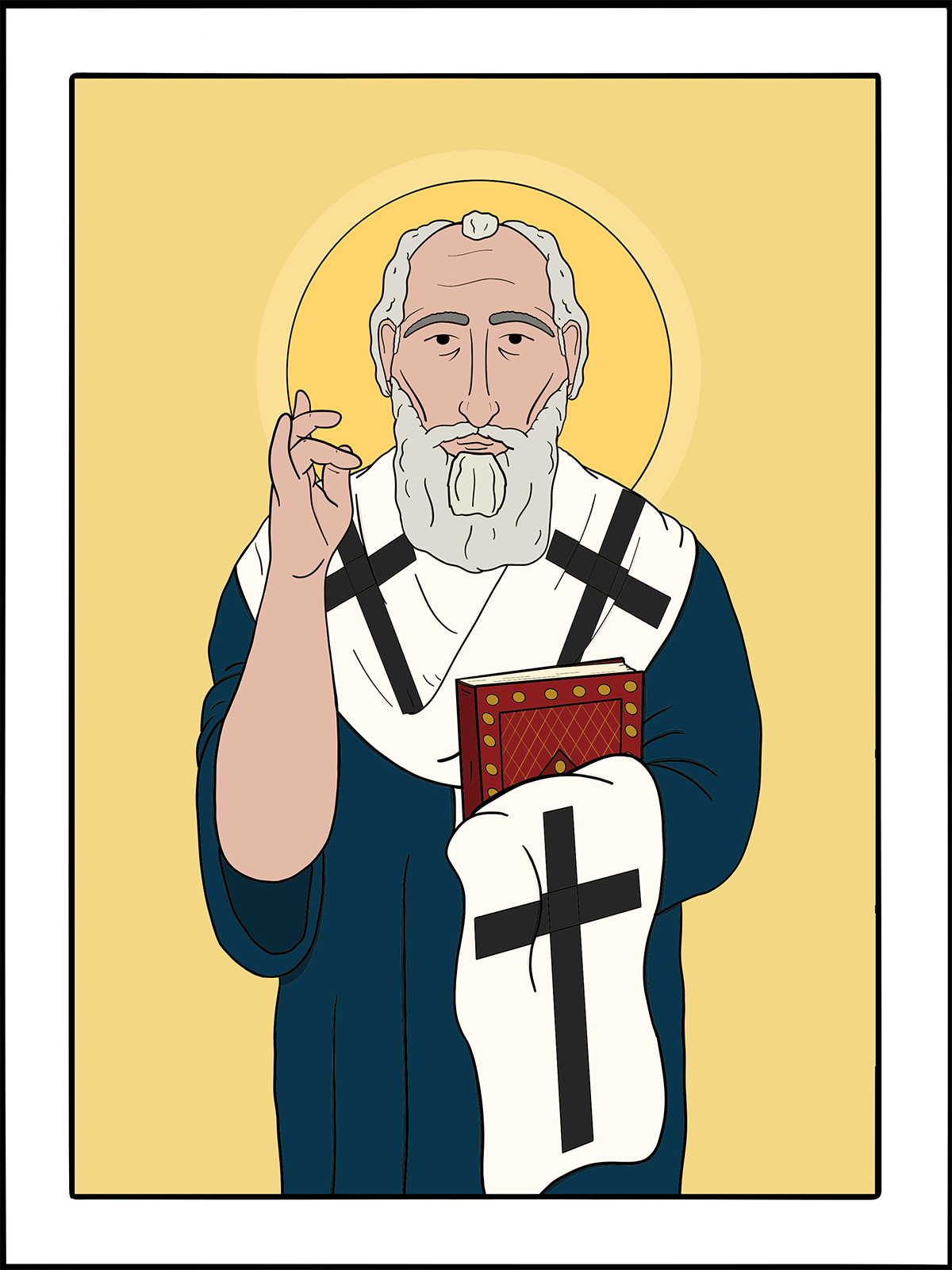
May 9
Gregory of Nazianzus
Bishop and Theologian, 389
art by Rev. Kirsten Kohr of Geneva, Ohio Almighty God, who has revealed to your Church your eternal Being of glorious majesty and perfect love as one God in Trinity of Persons: Give us grace that, like your bishop Gregory of Nazianzus, we may continue steadfast in the confession of this faith, and constant in our worship of you, Father, Son, and Holy Spirit; who live and reign for ever and ever. Amen.
Gregory of Nazianzus, one of the Cappadocian Fathers, loved God, the art of letters, and the human race—in that order. He was born about 330 in Nazianzus in Cappadocia (now Turkey), the son of a local bishop. He studied rhetoric in Athens with his friend Basil of Caesarea, and Julian, later to be the apostate emperor.
In 361, against his will, Gregory was ordained as a priest, which he described as an “act of tyranny.” At first, he fled with Basil to Pontus where he lived a monastic life of seclusion, but eventually, he returned home to assume the work of a priest. His Oration 2, “In Defense of his Flight to Pontus,” remains one of the classic treatments of the weight and responsibilities of the pastoral office. He writes: “I was ashamed of all of those men who intrude into these most sacred offices when they are no better than ordinary people. Indeed, it is really very lucky if they are not a good deal worse, with unwashed hands and uninstructed souls, laying claim to the sanctuary before being worthy even to approach the temple, and pushing and shoving their way up to the holy altar as if they thought that the priesthood was simply a way of earning a living rather than a pattern of virtue, or as though it were an absolute authority instead of a ministry for which we will have to render an account. Indeed, such priests are almost more numerous than those whom they are supposed to govern, pathetic with respect to piety and completely lacking in dignity, so that it seems to me that as time and evil progress, they will eventually have no one left to rule because everyone will be a teacher.”
In time, however, Gregory reconciled himself to his calling and felt prepared to undertake it, and settled down to live an austere, priestly life. He was not to have peace for long. Basil, in his fight against the Arian Emperor Valens, compelled Gregory to become Bishop of Sasima. According to Gregory, it was “a detestable little place without water or grass or any mark of civilization.” He felt, he said, like “a bone flung to the dogs.” His friendship with Basil suffered a severe break. Deaths in his family, and then that of his estranged friend Basil, brought Gregory himself to the point of death, and he withdrew into seclusion again for healing.
In 379, Gregory moved to Constantinople, a new man and no longer in despair. He appeared as one afire with the love of God. His fame as a theologian rests on five sermons he delivered during this period on the doctrine of the Trinity. They are marked by clarity, strength, and cheerfulness, and remain to this day one of the most influential expositions of Trinitarian theology. The next year, the new Emperor Theodosius entered Constantinople and expelled its Arian bishop and clergy. Then, on a rainy day, the crowds in the Great Church of Hagia Sophia acclaimed Gregory bishop, after a ray of sunlight suddenly shone on him.
Gregory was asked to preside over the ecumenical council in Constantinople in 381. However, exhausted by the politicking and infighting that beset the task, he shocked the assembled bishops by abruptly tendering his resignation. He retired to his hometown of Nazianzus, where he continued to write and minister to the people until his death in 389.
Excerpted directly from “Lesser Feasts and Fasts 2022,” p. 224-225.

